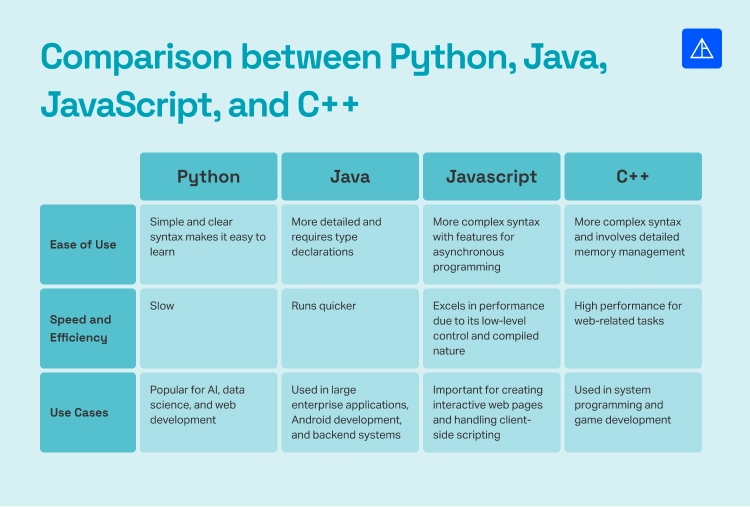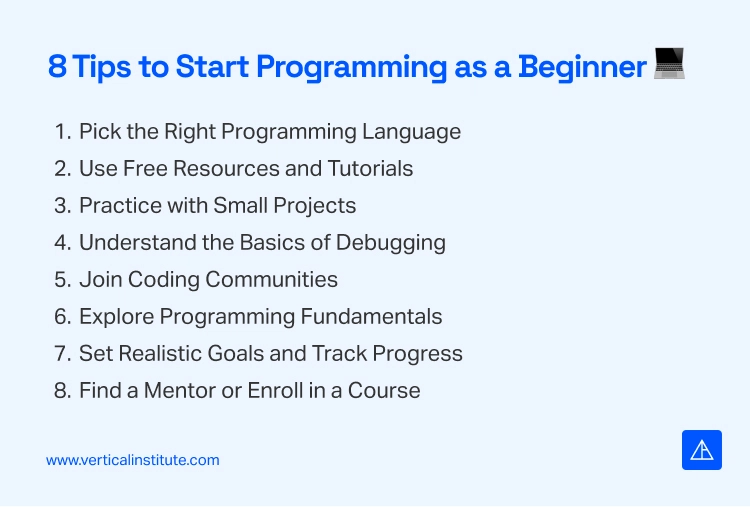According to a report by The Straits Times, Singapore boasts over 1.3 million coders and ranks as the ninth-largest contributor to artificial intelligence projects on GitHub. This highlights the nation’s significant role in shaping the global tech economy.
With the rising demand for programming expertise, many beginners may feel overwhelmed, wondering, “Where should I start?” Programming is an accessible and learnable skill for anyone willing to dedicate the time.
This guide provides eight practical tips to help you confidently write your first lines of code. Whether you’re looking to advance your career, enter the tech field, or simply pick up a new hobby, these steps will help you get started on the right foot.
Related: 7 Python Programming Fundamentals Every Developer Should Know
8 Tips to Start Programming as a Beginner
Here are 8 tips to help build your confidence in writing your first code:
1. Pick the Right Programming Language
The first step in learning to code is deciding which programming language to learn. Beginners often benefit from languages with simple syntax and broad community support. Research the type of projects you want to work on and choose a language aligned with your goals.
Here is a comparison of popular programming languages:

Related: Top 5 Reasons Aspiring AI Developers in Singapore Should Master Python
2. Use Free Resources and Tutorials
Learning programming doesn’t have to be expensive. The internet is filled with free resources that guide beginners step-by-step. Commit to one resource at a time to avoid getting overwhelmed.
- Online Platforms: Sites like W3Schools and Coursera provide interactive lessons.
- YouTube Tutorials: Channels like “Programming with Mosh” or “The Net Ninja” offer comprehensive tutorials catered to beginners.
- Books for Beginners: If you prefer traditional learning, try Eric Matthes’s Python Crash Course or Marijn Haverbeke’s Eloquent JavaScript.
3. Practice with Small Projects
Practice is the key to mastering programming. Theory alone won’t help unless you start building real-world projects.
- Basic Projects for Beginners:
- A simple calculator
- A guessing game
- An essential website with HTML and CSS
- A to-do list app using JavaScript
These projects teach you to apply your knowledge and troubleshoot common errors. Gradually, you’ll develop problem-solving skills and confidence in your abilities.
4. Understand the Basics of Debugging
Errors are inevitable in programming, even for professionals. Instead of fearing them, learn how to debug effectively. Debugging is like solving a puzzle—it sharpens your critical thinking skills.
- Read Error Messages: Error messages might look intimidating, but they often tell you exactly what went wrong.
- Break It Down: Divide your code into smaller chunks to find where the error occurs.
- Seek Help: Platforms like Stack Overflow or Reddit’s programming communities can provide quick solutions.
5. Join Coding Communities
Learning alone can feel isolating. By joining coding communities, you can connect with others, exchange knowledge, and stay motivated. Communities provide encouragement and inspiration to keep going.
- Online Communities: Participate in forums like GitHub Discussions, Stack Overflow, or Reddit’s r/learnprogramming.
- Coding Meetups: Attend local or virtual meetups to network with like-minded individuals.
6. Explore Programming Fundamentals
Before diving into advanced projects, spend time understanding the core concepts of programming.
- Variables and Data Types: Learn how to store and manipulate data in your chosen language.
- Control Structures: Understand loops (for, while) and conditionals (if, else).
- Functions: Write reusable blocks of code to streamline your programs.
- Data Structures: Familiarize yourself with arrays, lists, and dictionaries.
7. Set Realistic Goals and Track Progress
Goal-setting is crucial when learning a new skill. Break your journey into small, achievable milestones. Tracking your progress helps you stay motivated and see how far you’ve come.
- Daily Goals: Dedicate 30 minutes to learning and practising coding each day.
- Weekly Goals: Complete a project or solve a set of coding problems weekly.
- Long-Term Goals: Build a portfolio showcasing your projects within three to six months.
8. Find a Mentor or Enrol in a Course
Guidance from someone experienced can save you time and frustration. A mentor can help you avoid common mistakes and provide insights from their experience. Look for courses with hands-on projects and certifications to add value to your learning.
- Why Enroll in a Course? Courses provide a structured curriculum tailored to beginners. They also offer access to instructors and peers who can help you.
Vertical Institute offers a beginner-friendly Data Science course for those interested in applying programming skills to data analysis and insights. The course covers essential tools like Python, pandas, and data visualisation libraries. In just 21 hours, you’ll gain practical, career-ready skills by working on real-world datasets and hands-on projects. It’s ideal for individuals looking to start a tech career or enhance their analytical abilities.

Conclusion
Programming opens the door to transforming ideas into reality. It fosters logical thinking, creativity, and problem-solving. Every line of code you write builds your understanding and brings you closer to creating something impactful. Begin with curiosity, embrace the process, and let your growth unfold one step at a time.
Calculate Your Potential Salary as a Programmer or Data Scientist
Use Vertical Institute’s Salary Calculator to uncover your earning potential in programming and data science. Try it now!
SALARY CALCULATOR
Discover how much you can earn in your dream role.
About Vertical Institute
Vertical Institute is shaping the future of work by preparing individuals for tomorrow’s job market. Our courses and certification focus on teaching essential skills and nurturing the next generation of innovators and leaders.
As an Approved Training provider (ATO) accredited by SkillsFuture Singapore (SSG) and the Institute of Banking & Finance Singapore (IBF), our courses adhere to the highest standards. They are government-subsidised and eligible for SkillsFuture Credits or NTUC UTAP Funding.



